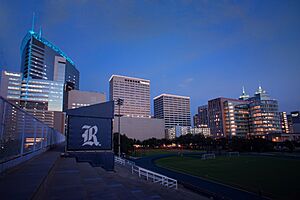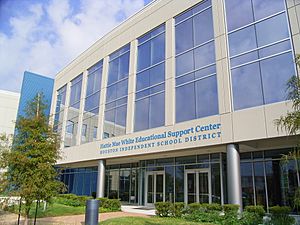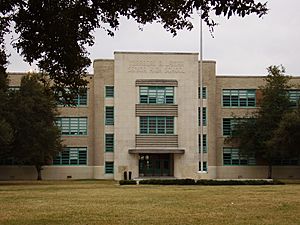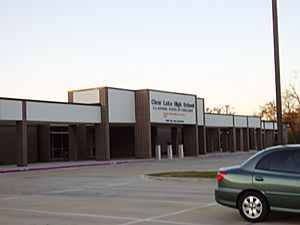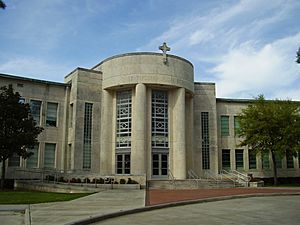Education in Houston facts for kids
This article is about the different ways people learn and get an education in Houston, Texas. From schools for young kids to big universities and special medical centers, Houston offers many chances to learn and grow.
Contents
Learning at the Texas Medical Center
Houston is home to the famous Texas Medical Center. This is the world's largest collection of places that focus on health and medical research. All 47 groups that are part of the Medical Center are non-profit. This means they use their money to help people, not to make a profit.
They help patients, teach new doctors and nurses, and do important research. More than 73,600 people work here! The Medical Center has 13 hospitals, two medical schools, and schools for nursing, dentistry, and many other health jobs. It's where the first air ambulance service, Life Flight, started. More heart operations happen here than anywhere else in the world.
Some of the well-known places at the Medical Center include MD Anderson Cancer Center, which is one of the best cancer hospitals. Also, Baylor College of Medicine is a top medical school. These places help people get better and discover new ways to fight diseases.
Colleges and Universities
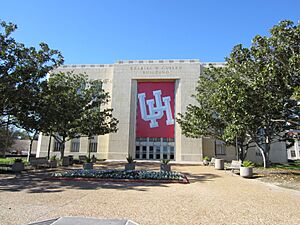
Houston has several large state universities. The University of Houston is a major research university. It is one of the biggest universities in Texas, with almost 44,000 students. The University of Houston–Clear Lake and the University of Houston–Downtown are also important universities in the city.
Texas Southern University is another big university in Houston. It is one of the largest historically black colleges and universities in the United States.
These universities bring a lot of good things to Houston. They attract new money to the area and create many jobs. Plus, thousands of students graduate each year and often stay to work in Houston.
Houston also has private universities. Rice University is a very well-known teaching and research university. It is often ranked among the top universities in the United States.
There are also community colleges around Houston. These colleges offer classes that can help you get a job or prepare you to go to a four-year university. The Houston Community College System and the Lone Star College System are two of the largest community college systems in the country.
Schools for Kids and Teens
Most students in Houston go to public schools. About 91% of students attend public schools, while about 9% go to private schools.
Public Schools
In Texas, public schools are managed by the Texas Education Agency. Houston is served by 24 different school districts. The biggest one is the Houston Independent School District (HISD). Other districts that serve parts of Houston include Spring Branch, Alief, and Aldine. Many other districts also cover parts of the city.
There are also many charter schools in Houston. These schools are public schools, but they are run a bit differently from traditional school districts. Some are overseen by the state, and others are part of regular school districts like HISD. In 2017, some of the largest charter school groups in Houston included KIPP Houston, Harmony Public Schools, and Yes Prep.
In the past, schools for African-American students had fewer resources. They often had less money and fewer teachers compared to schools for other students.
Private Schools
Houston has many private schools. These schools can be connected to different religions, like Catholic, Jewish, or Muslim, or they can be non-religious. The state of Texas does not control private schools. Many private schools choose to be approved by special groups to show they offer good education.
Some well-known private schools in Houston include:
- Awty International School
- The Kinkaid School
- St. John's School
- Strake Jesuit College Preparatory (for boys)
- Saint Agnes Academy (for girls)
- St. Thomas High School (for boys)
In the 1990s, more parents started sending their children to private schools. This was partly because the economy was strong and some parents wanted religious education.
Homeschooling
Many families in the Houston area choose to homeschool their children. This means parents teach their children at home instead of sending them to a traditional school. There are many groups and organizations in Houston that help homeschooling families with classes and resources.
Libraries
Public Libraries
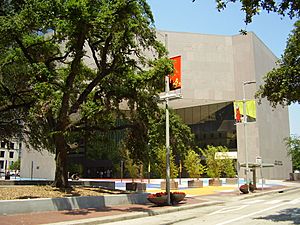
Houston residents can use the Houston Public Library and the Harris County Public Library. The Houston Public Library has 36 branches, plus a main library downtown. The Harris County Public Library has 26 branches, mostly serving areas outside the city.
Universities like the University of Houston and Rice University also have large libraries.
Other Libraries
Houston also has special libraries, like the Sansui-Kai Center Library, which has Japanese-language books. The Italian Cultural and Community Center also has a library.
Special Education Programs
The Japanese Language Supplementary School of Houston is a special school for Japanese-speaking children. It helps kids aged 5 to 18 who are temporarily living in the United States keep up with their Japanese studies.
 | Selma Burke |
 | Pauline Powell Burns |
 | Frederick J. Brown |
 | Robert Blackburn |


